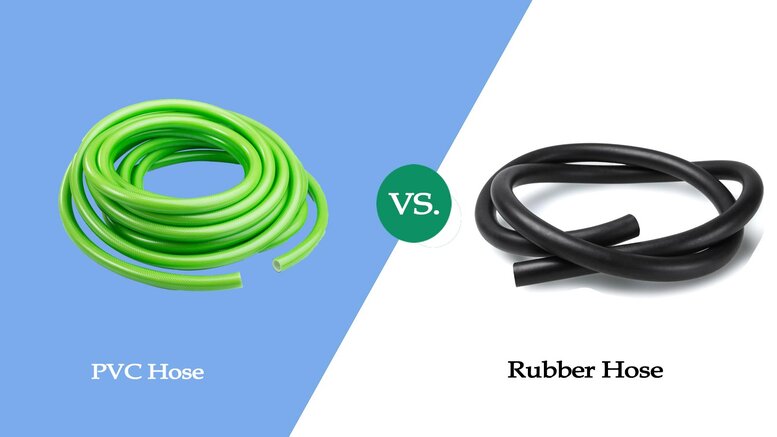When selecting the proper hose for your process, it’s easy to get overwhelmed by all the available alternatives.
Two of the most famous kinds are PVC hoses and rubber hoses. While they appear similar, they perform differently depending on the task.
This article will walk you through the key differences between PVC and rubber hoses so that you can select the one that is best for your needs.
Let’s dive in and read more about which hose is probably the better in shape for your venture.
What Is a PVC Hose?
PVC (polyvinyl chloride) is a lightweight, artificial plastic polymer used throughout many industries.
When it involves hoses, PVC hoses are recognised for being:
- Light in weight
- Resistant to abrasion and chemical substances
- Budget-pleasant
They’re an incredible desire for jobs that don’t involve extreme conditions or high-pressure needs.
What Is a Rubber Hose?
Rubber hoses, then again, are crafted from natural or synthetic rubber.
They’re more bendy, durable, and handle challenging operating environments better than their PVC counterparts. You’ll regularly locate rubber hoses in garages, production websites, and commercial settings.
Key Differences Between PVC and Rubber Hoses
Let’s break it down further.
1. Flexibility and Handling
If you want a hose that stays bendy in cold weather, rubber is the clear winner. Rubber hoses continue to be bendable even in freezing temperatures.
PVC hoses can grow stiff and challenging to address when exposed to cold, which may cause cracks if bent.
2. Durability
Rubber hoses are extra rugged. They can face excessive pressures, heat, oil, or even a few chemical substances. You can drag them over concrete or gravel; they’ll typically hold up fine.
While durable in controlled environments, PVC hoses don’t perform well under rough conditions. They’re more suitable for lighter-duty work.
3. Weight
PVC hoses are distinctly lighter. If you are hauling hoses around all day, you’ll likely recognize how clean they are to move.
Rubber hoses are heavier, but that weight comes with brought strength.
4. Cost
PVC is generally the more affordable alternative if you’re on a reasonable budget. You can get an extended PVC hose for a fraction of the cost of a rubber one.
Rubber hoses, whilst more expensive, provide higher sturdiness and performance in the long run.
5. Resistance to Kinks
Ever fought with a hose that kinks up on every occasion you turn a corner?
Rubber hoses are much less likely to kink and are less complicated to straighten. PVC hoses are stiffer and more liable to kink, especially when cold.
- Which One Should You Choose?
- For Light-Duty Home Use:
- Washing your automobile? Watering your garden?
A PVC hose is usually all you need. It’s lightweight, cheap, and easy to handle. Just preserve it from harsh weather.
For Heavy-Duty Work:
Working in a store? Need a hose for an excessive-pressure air compressor?
Go for a rubber hose. It’ll cover heat, stress, oil, and rugged terrain without blinking.
If you want dependable delivery, don’t forget to work with a dependable PVC Hose Manufacturer to get high-quality products for lighter programs.
Typical Applications for Each Hose Type
PVC Hoses Are Best For:
- Gardening
- Light air tools
- Water transfer
- General domestic use
Rubber Hoses Are Best For:
- Automotive stores
- Industrial air equipment
- Hot water applications
- Construction websites
- Pros and Cons at a Glance
Here’s a short recap, minus the desk:
PVC Hose Pros:
- Lightweight
- Cost-effective
- Good for mild-duty work
PVC Hose Cons:
- Prone to kinking
- Not remarkable in a bloodless climate
Rubber Hose Pros:
- Very long-lasting
- Handles warmth and stress
- Long lifespan
- Rubber Hose Cons:
- Heavier
- Higher preliminary value
Environmental Factors to Consider
Weather and area play a prominent role in selecting the proper hose.
If you’re in a place with warm summers and freezing winters, rubber is more adaptable. But if your hose lives in a small storage or shed, PVC can handle the task exceptionally well.
Final Thoughts
Choosing between a PVC and a rubber hose isn’t about which is “higher” normal — it’s about selecting the proper tool for the appropriate job.
If you want something lightweight, low-cost, and easy to deal with, go with PVC.
If you want a long-lasting, bendy, and long-lasting solution for extra extreme tasks, rubber is your excellent bet.
Whichever direction you take, please buy from a reliable provider that stands by its products.
Need help choosing the proper hose for your needs?
Talk to your neighborhood professional or contact a PVC Hose Manufacturer who can walk you through the specifications and help you with the correct hose.
Read More: Ariana Grande



